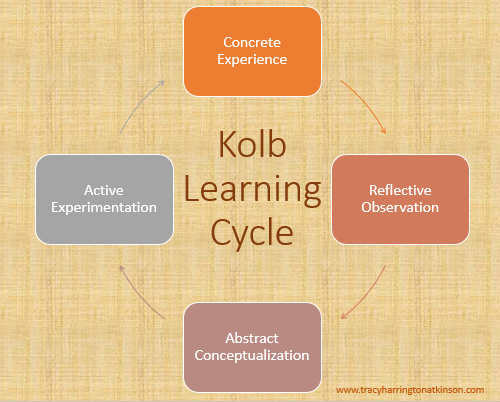
The Kolb Learning Cycle is a four stage, experiential cycle where the learner ought to go through each of the four stages.
This learning process is an integrated progress in which each stage supports the next through a progressive process. However, there is no beginning and no end. The learner may start at any stage and may end at each stage, as long as the learner goes through each point in a sequential and logical methodology. It is important to note that the most effective learning occurs when all four stages of the model are used and experienced.
The four stages of the Kolb Learning Cycle are:
Concrete Experience
Reflective Observation
Abstract Conceptualization
Active Experimentation
In basic terms, this cycle consists of experience, reflect, think and act.
What is experiential learning?
Experiential learning is the application of real-world experience that enhances learning. These experiences can be formal – in a classroom or intentional activities within a work or play environment, but they can also occur informally as the learner interacts with their environment. Experiential learning can also be done individually, in teams or in groups.
Kolb describes experiential learning as “the ideal process of learning, invites you to understand yourself as a learner, and empowers you to take charge of your own learning and development” (Experiential Learning).
Concrete Experience is the process by which the individual actually participates in the learning experience. This is the point when a new situation is encountered; New information is presented. The individual may even encounter old information but is reinterpreting it or reframing it in a new context.
Reflective Observation is the process by which the learner will reflect on the information or experience. They will see the situation and even evaluate the successes and failures. They will review it. This is the point when the learner notes any discrepancies between what they may have experienced and their prior understanding. They will begin to navigate these differences.
Abstract Conceptualization is the thinking piece where the individual begins to draw conclusions and effectively learns from the experience. The learner may also create new ideas from the experience or modify existing knowledge.
Active Experimentation is the stage where the learner applies the new information or knowledge. They will plan, experiment and use the information. The learner will apply the new ideas to their world and recognize what happens from applying the information and knowledge.
They may even apply it to new situations to create another new learning experience whereby the cycle starts again with the Concrete Experience.
Sources:
Experiential Learning. (2021). What is Experiential Learning. Retrieved from: https://experientiallearninginstitute.org/resources/what-is-experiential-learning/
Kolb, D.A. (1984). Experiential learning: experience as the source of learning and development. Englewood Cliffs, NJ: Prentice Hall.
McLeod, S. A. (2013). Kolb – Learning Styles. Retrieved from www.simplypsychology.org/learning-kolb.html
Subscribe to our YouTube Channel by clicking here.
By Tracy Atkinson
Tracy Atkinson, mother of six, lives in the Southwest with her husband and spirited long-haired miniature dachshunds. She is a teacher, having taught elementary school to higher education, holding degrees in elementary education and an EDS in higher education. Her passion is researching, studying and investigating the attributes related to self-directed learners and learning styles. She has published several titles, including MBTI Learning Styles: A Practical Approach, The Art of Learning Journals, Calais: The Annals of the Hidden, Lemosa: The Annals of the Hidden, Book Two, Rachel’s 8 and Securing Your Tent. She is currently working on a non-fiction text exploring the attributes of self-directed learners: The Five Characteristics of Self-directed Learners.

Comments are closed